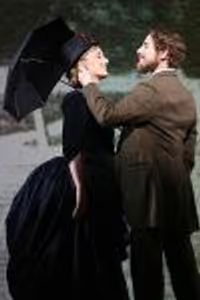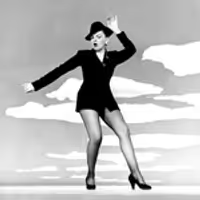John McWhorter’s NY Times Opinion Piece on City Center’s Encores
#1John McWhorter’s NY Times Opinion Piece on City Center’s Encores
Posted: 2/15/22 at 10:37pm
Did anyone read it? I can’t seem to paste it.
#2John McWhorter’s NY Times Opinion Piece on City Center’s Encores
Posted: 2/15/22 at 10:50pm
It's an excellent piece.
DaveyG
Broadway Star Joined: 8/11/05
#3John McWhorter’s NY Times Opinion Piece on City Center’s Encores
Posted: 2/15/22 at 10:52pm
https://www.nytimes.com/2022/02/15/opinion/woke-broadway-encores.html?referringSource=articleShare&fbclid=IwAR1NQgnD9FYuRKAJ3hO77HaCV6xqbl5fzS_vzBJmlegpzlX4TgUxxuurC1o
He makes a lot of sense. I think Encores! is headed in a terrible direction if this is the new mission.
#4John McWhorter’s NY Times Opinion Piece on City Center’s Encores
Posted: 2/15/22 at 11:07pm
Holy crap, that’s a brilliant article.
#5John McWhorter’s NY Times Opinion Piece on City Center’s Encores
Posted: 2/15/22 at 11:28pm
He is one of the greatest writers and thinkers of our time. I look forward to reading this!
His tribute to Sondheim was beautiful, too.
Feb. 28 - Looped, Feb. 28 - Next to Normal, March 4 - Hair, March 11 - A Little Night Music, March 24 - Time Stands Still, April 6 - La Cage Aux Folles, April 10 - Anyone Can Whistle (City Center), April 10 - Looped, May 9 - Enron, May 15 - A Little Night Music, May 15 - A Behanding In Spokane, May 30 - A Behanding In Spokane, May 30 - A Little Night Music, June 20 - A Little Night Music, June 23 - Red, June 23 - Sondheim on Sondheim, July 13 - A Little Night Music, July 18 - The Grand Manner (Lincoln Center)
#6John McWhorter’s NY Times Opinion Piece on City Center’s Encores
Posted: 2/15/22 at 11:52pm
I was expecting all this to be a lead-up to a convo about MUSIC MAN!
He makes many great points. But I do think some shows deserve to have another set of eyes when they're put in front of contemporary audiences –– whether it's at Encores or elsewhere. If there's something distracting or gratuitous, by all means take it out. Jack Viertel said the first step of trimming/adapting a book for Encores! is to take out "the wife-beating jokes."
Too much course-correcting leads to sanitizing work and creating boring characters...a character being morally "right" or "wrong" isn't a reflection on the author/producer, and too many people in the Twitterverse/TikTokverse seem to be mistaking those things. By making Licorice Pizza, Paul Thomas Anderson isn't saying it's right for a 25 year old woman to kiss a 16 year old boy after showing us 2+ hours of detailed character work & journey.
Additionally, with the recent "controversial" musicals Jagged Little Pill and Tootsie, virtually NONE of that internet chatter permeated beyond the walls of Twitter and chatrooms. The shows failed because audiences weren't interested in seeing them at full price and they weren't that great overall –– not because of the supposed offensive aspects. People seem to be taking the wrong things away from those flops.
I think some people view identifying and removing problems to be a demonstration of intelligence. When in actuality, identifying and figuring out how to make it work might yield more interesting results. Also asking who is offended, why will it offend them, and what percentage of our audience is it?
#7John McWhorter’s NY Times Opinion Piece on City Center’s Encores
Posted: 2/16/22 at 12:11am
I don't necessarily agree with everything in this article, but he does make some good points overall.
I agree that of all theatre companies. Encores is perhaps the most equipped to present shows as they were originally written. As McWhorter points out, Encores' very mission establishes an implicit "disclaimer" on the work. There's collective understanding between the audience and the company that we're examining this old piece in all its flaws, within the context of when it was written. And with expansive program notes, talkbacks, etc. they have the infrastructure in place to allow audience to flex their media literacy muscles.
McWhorter then expands his argument storytelling art at large, and that's where I think things get a little bit trickier, though I still think he makes good points. I agree that we should be striving for a place where we can analyze a piece of media from the past; acknowledge where it's outdated, and appreciate what it still has to offer (I'm a big fan of the Bechdel Cast podcast, where they regularly criticize outdated tropes while admitting they love the films in question)
But it's easier with film, because film is done - it can be re-watched, but the context of its creation exists firmly and solidly in the past. But theatre is trickier, because it always exists in the moment, to a certain degree. To put on a show is to make a conscious decision to tell a story in THIS way at THIS time. And like I said, Encores! is one of the few companies with a built-in disclaimer. Other companies are more vulnerable; there's an implicit pressure to fully "own up" to whatever they're putting on. Especially in commercial Broadway productions where there's less intellectual infrastructure surrounding it.
Maybe the answer is to collectively remove that pressure on companies to "own" whatever they put on with no reservations or disclaimers, and allow the audience to do that work themselves. And in thinking for themselves, they will be able to recognize where things could've been done better, and seek to use that as a tool in looking forward at art in the future. I think that's probably the ultimate ideal.
But a part of me worries that we simply haven't reached the sufficient critical mass to trust audiences to do that work. We live in a country where a huge portion of the population is determined to reject any attempt to criticize a work of art for being problematic - even if those criticisms are done in good faith, with a balanced appreciation for what it still has to offer. A huge portion of this country (hell, even this message board!) are categorically opposed to engaging in this kind of literacy; the kind of literacy McWhorter suggests that we trust audiences to exercise themselves, with no context from those presenting it.
In the absence of that trust, I can see why theatre-makers still feel the need to make it clear where they stand, and be conscious of what they're actively putting out into the world.
As for McWhorters broader point about how the value of a work of art isn't inherently tied to social justice - sure, that's true enough. But we live in a complicated world where systemic oppression and implicit bias are so deeply engrained in our culture that they pop in places one might not expect, and it's worth being aware of those things as they come up, even in works of art those don't aim to address social justice issues. Likewise, we can acknowledge that much of our artistic principles of craft and theory come from predominately White European elitism, and use that awareness to try to make room for other kind's of ideas from other cultures, without throwing out what we already have.
chrishuyen
Broadway Legend Joined: 11/12/14
#8John McWhorter’s NY Times Opinion Piece on City Center’s Encores
Posted: 2/16/22 at 12:16am
I've always enjoyed John McWhorter's opinion (he's been a guest multiple times on the Pivot podcast, which I listen to religiously), and I agree with a lot of what he says here. I suppose part of it comes back to the debate on whether revivals should be a classical remounting or a way to take a different look at an old show, but Encores seems unwilling to pick a side (and the changes to recent Carousel/Music Man revivals don't seem to have gone over all that well either). If they had really gone in on deciding to reimagine the show, I don't necessarily think that would be a bad thing per se, but with the way that Encores productions are structured, I doubt they have the necessary time to really break down a show piece by piece and decide how to reconstruct it (a la Daniel Fish's Oklahoma).
But I think this could've been an opportunity to really bring dramaturgy to the forefront, maybe have a pre-show conversation about this piece's place in history and the kinds of sensibilities people had then (and honestly, fat-shaming is still very common now, so not really sure what they were trying to sanitize here). And while I agree that certain things may take audiences out of the show, I feel like most of the Encores audiences aren't necessarily there to see a show that would be held to the same standard as today's shows in terms of political correctness, etc.
#9John McWhorter’s NY Times Opinion Piece on City Center’s Encores
Posted: 2/16/22 at 12:48am
Too many people also seem way too focused on "our show is for EVERYONE." When no show (or film or book) is for everyone. You're not going to find a consensus.
You could sink hours and money into consultants and strategists and focus groups to try to make your show palatable to the (for example) 1% Trans population or 1% Native American population, and during that alienate a much larger chunk of the audience population INCLUDING some of the people you're attempting to appease.
JasonC3
Broadway Legend Joined: 4/22/21
#10John McWhorter’s NY Times Opinion Piece on City Center’s Encores
Posted: 2/16/22 at 1:13am
Of course one doesn't have to belong to an identity group to have an objection to how it may be represented on stage. I'm not sure percentages should be the driving metric.
I'm not transgender, but I'd take exception to hurtful or stereotypical portrayals of (or comments about) transgendered individuals in a production unless it was an integral element of the plot.
#11John McWhorter’s NY Times Opinion Piece on City Center’s Encores
Posted: 2/16/22 at 1:28am
I’m not a fan of omitting anything really from these productions. I’m also an adult capable of understanding time and history as context to things that are no longer considered acceptable by todays standards. But the articles point about film is a solid one. As a lover of classic films, are we then going to splice out “objective” scenes or dub over words that aren’t commonly used now or are seen in a different way?
I almost feel as a society we need to re-learn how to see and hear things with an understanding of where and when they came from instead of the blanket outrage and rush to “cancel” any and everything that came before this very moment.
#12John McWhorter’s NY Times Opinion Piece on City Center’s Encores
Posted: 2/16/22 at 7:01am
This reminds me of a Content Advisory sticker that is on a new Disney Blu-Ray re-release:
“Stories Matter: This program includes negative depictions or mistreatment of people or cultures. Rather than remove this content, we want to acknowledge its harmful impact and spark conversations to create a more inclusive future.”
I think this is the most appropriate way to address situations like this, and don’t see why this sort of advisory can’t be included in say, a Playbill slip.
#13John McWhorter’s NY Times Opinion Piece on City Center’s Encores
Posted: 2/16/22 at 8:26am
The article is behind a paywall. Anyone willing to summarize it here?
#14John McWhorter’s NY Times Opinion Piece on City Center’s Encores
Posted: 2/16/22 at 9:04am
I think the article makes strong points, if the two examples cited are weak. TAP DANCE KID perhaps, as it did the strange thing of taking away a part by a fuller bodied actor, but I guess one where the character's appearance was consistently denigrated (though ultimately, this is corrected, which is more than often happens in life).
But THE LIFE sounds like the example of a good rewrite, not to make it more woke, but enhance the drama. They're trying to get out, as they are in the original, but the forces keeping them down are both other character and a system.
So, at times the article seemed a bit of a straw man.
#15John McWhorter’s NY Times Opinion Piece on City Center’s Encores
Posted: 2/16/22 at 9:20am
^I would argue that the best "woke" updates are the ones that don't feel like patchworks, but instead feel like a cohesive directorial / adaptational angle that's both woven into the drama, and also working in dialogue with the original material.
#16John McWhorter’s NY Times Opinion Piece on City Center’s Encores
Posted: 2/16/22 at 9:37am
“But THE LIFE sounds like the example of a good rewrite, not to make it more woke, but enhance the drama.”
But that’s besides the point. I could do a rewrite to Casablanca to enhance the drama, but should I? The point of Encores is to revisit these shows not to rewrite them.
Islander_fan
Broadway Legend Joined: 6/25/14
#17John McWhorter’s NY Times Opinion Piece on City Center’s Encores
Posted: 2/16/22 at 10:42am
I have never been a fan of censorship in the arts. I think that when an older work is revived either by City Center or elsewhere, and someone is offended, that issue should be on the audience member in attendance rather than it being on the part o the theatre to alter a line as to not offend anyone. Hell, put a note in the playbill if you want. Things change over time, and we know that there are works that are still important to see and have valid important things to say while also being a product of its time. That’s why I rolled my eyes when there was the issue with Gone With the Wind a little while back.
This isn’t a theatre related example about things changing but still. In the 60s in a lot of Jewish populated neighborhoods, would refer to Chinese food as Chinks. As in, we’re going out for chinks for dinner tonight. We now know that that’s totally wrong to say. Yet, we do have the ability to realize as well that that was a product of its time. Doesn’t make it right. But, It was said, and did happen so the idea of, say, canceling it out is beyond silly to me.
themick2
Chorus Member Joined: 2/16/22
#18John McWhorter’s NY Times Opinion Piece on City Center’s Encores
Posted: 2/16/22 at 11:48am
This essay is very spot on. Theaters today are flat-out terrified of offending anyone and it's getting ridiculous.
As for THE LIFE, I was under the impression that the book was a preposterous mess (with a great score) way back when, so if they want to go and make it work, so be it. Unfortunately, it's been handed to Billy Porter who throws around smug, self-admiring concepts like "radical empathy" and then goes on to describe a Nordic model/savior attitude towards sex workers.
#19John McWhorter’s NY Times Opinion Piece on City Center’s Encores
Posted: 2/16/22 at 12:13pm
Islander_fan said: "I have never been a fan of censorship in the arts. I think that when an older work is revived either by City Center or elsewhere, and someone is offended, that issue should be on the audience member in attendance rather than it being on the part o the theatre to alter a line as to not offend anyone. Hell, put a note in the playbill if you want. Things change over time, and we know that there are works that are still important to see and have valid important things to say while also being a product of its time. That’s why I rolled my eyes when there was the issue with Gone With the Wind a little while back.
This isn’t a theatre related example about things changing but still. In the 60s in a lot of Jewish populated neighborhoods, would refer to Chinese food as Chinks. As in, we’re going out for chinks for dinner tonight. We now know that that’s totally wrong to say. Yet, we do have the ability to realize as well that that was a product of its time. Doesn’t make it right. But, It was said, and did happen so the idea of, say, canceling it out is beyond silly to me."
Very well put and I agree totally.
#20John McWhorter’s NY Times Opinion Piece on City Center’s Encores
Posted: 2/16/22 at 12:18pm
Islander_fan said: "I have never been a fan of censorship in the arts. I think that when an older work is revived either by City Center or elsewhere, and someone is offended, that issue should be on the audience member in attendance rather than it being on the part o the theatre to alter a line as to not offend anyone. Hell, put a note in the playbill if you want. Things change over time, and we know that there are works that are still important to see and have valid important things to say while also being a product of its time. That’s why I rolled my eyes when there was the issue with Gone With the Wind a little while back.
This isn’t a theatre related example about things changing but still. In the 60s in a lot of Jewish populated neighborhoods, would refer to Chinese food as Chinks. As in, we’re going out for chinks for dinner tonight. We now know that that’s totally wrong to say. Yet, we do have the ability to realize as well that that was a product of its time. Doesn’t make it right. But, It was said, and did happen so the idea of, say, canceling it out is beyond silly to me."
Can you please censor this to not actually include the slur in its full form?
Encores used to be about presenting forgotten musicals fairly closely to how they were, and showing (and even highlighting) what doesn’t work through a modern lens. I feel like it was never a fixer-upper mission statement. I’m a believer that a strong directorial vision can say more than a rewrite (look at the recent My Fair Lady ending, the Oklahoma! revival), unless something is obviously offensive and should be revised for the preservation of the piece as a whole. For example, I welcomed their proposed revision of Thoroughly Modern Millie because how were we so ignorant to allow yellowface and anti-Asian sentiments onstage in 2002?
#21John McWhorter’s NY Times Opinion Piece on City Center’s Encores
Posted: 2/16/22 at 12:23pm
But if you’re saying Encores shouldn’t have a fixer-upper mission statement yet welcome those changes to “Millie”, aren’t you advocating for exactly what you said shouldn’t be?
bwayobsessed
Broadway Star Joined: 5/28/13
#22John McWhorter’s NY Times Opinion Piece on City Center’s Encores
Posted: 2/16/22 at 12:24pm
Islander_fan said: "I have never been a fan of censorship in the arts. I think that when an older work is revived either by City Center or elsewhere, and someone is offended, that issue should be on the audience member in attendance rather than it being on the part o the theatre to alter a line as to not offend anyone. Hell, put a note in the playbill if you want. Things change over time, and we know that there are works that are still important to see and have valid important things to say while also being a product of its time. That’s why I rolled my eyes when there was the issue with Gone With the Wind a little while back.
This isn’t a theatre related example about things changing but still. In the 60s in a lot of Jewish populated neighborhoods, would refer to Chinese food as c****s. As in, we’re going out for c****s for dinner tonight. We now know that that’s totally wrong to say. Yet, we do have the ability to realize as well that that was a product of its time. Doesn’t make it right. But, It was said, and did happen so the idea of, say, canceling it out is beyond silly to me."
To use your example, I would argue if a show was a period piece about the relationship between Chinese and Jewish people in the neighborhood, then keeping the slur in makes sense. But if the show is really about a Jewish boy’s coming of age story and they just get Chinese food for dinner one night there’s no point to leave in a word that would totally take a modern audience out of it.
#23John McWhorter’s NY Times Opinion Piece on City Center’s Encores
Posted: 2/16/22 at 12:25pm
Perhaps I should have said I welcome the revision but not necessarily under Encores’s umbrella.
#24John McWhorter’s NY Times Opinion Piece on City Center’s Encores
Posted: 2/16/22 at 12:27pm
bwayobsessed said: "To use your example, I would argue if a show was a period piece about the relationship between Chinese and Jewish people in the neighborhood, then keeping the slut in makes sense.”
This sounds like a fascinating show.
#25John McWhorter’s NY Times Opinion Piece on City Center’s Encores
Posted: 2/16/22 at 12:28pm
HeyMrMusic said: "Perhaps I should have said I welcome the revision but not necessarily under Encores’s umbrella."
Ah. I get what you’re saying. :)
Videos










